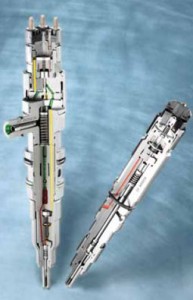 Bosch is increasing the maximum injection pressure of its common-rail injection systems for commercial vehicles to 2,500 bar. Higher injection pressures means lower fuel consumption and emissions. Even a one per cent reduction in fuel consumption of heavy commercial vehicles means a more than one metric ton reduction in annual CO2 emissions per vehicle.
Bosch is increasing the maximum injection pressure of its common-rail injection systems for commercial vehicles to 2,500 bar. Higher injection pressures means lower fuel consumption and emissions. Even a one per cent reduction in fuel consumption of heavy commercial vehicles means a more than one metric ton reduction in annual CO2 emissions per vehicle.
In its latest variant, the CRSN3-25 injection system for medium and heavy commercial vehicles delivers a maximum injection pressure of 2,500 bar. With its pressure-balanced interior, the innovative injector concept offers an especially high level of hydraulic efficiency. Since its exterior geometry remains unchanged, the injector used in the CRSN3-25 is compatible with its predecessor system.
Another advantage of the new system is an improved diagnostic capability. Thanks to an integrated pressure limiter, a comprehensive system check can be carried out when the vehicle is being serviced.
Combined with exhaust gas recirculation and SCR systems, Bosch high-pressure injection systems make a significant contribution to reducing fuel consumption and nitrogen oxides. However, the combustion processes that this involves require high injection pressures in order to prevent a rise in particulate raw emissions. Common-rail systems already deliver high injection pressures in part-load operation, as the system pressure is generated practically independently of engine speed. As a result, common-rail diesel engines have high torque even at low rpm.
With the CRSN3-25, up to seven individual injections are possible. This increases flexibility in terms of engine design, promotes lower exhaust and fuel consumption levels, and results in even quieter operation. Thanks to a software learning feature, the amount of fuel injected can be adjusted. This makes it possible to meet strict emission standards over the entire vehicle life cycle, even when annual mileage is high. As a result, Bosch is making a significant contribution to meeting the Euro VI emissions standard, which will come into force in 2013, as well as other comparable strict standards, such as US 10 in the US.
For heavy duty vehicles, a new generation of the CPN5 high-pressure pump can be applied. In addition to generating pressures of up to 2,500 bar, it is especially compact, robust, and lightweight. The pump has a service life of 1.6 million km and 15,000 operating hours in off-highway applications. Its service life is thus longer than that of the average vehicle.
Bosch injection systems with even higher injection pressures are currently in the pipeline. The company is also working on additional systems to reduce fuel consumption and emissions. For instance, it has developed CNG injection systems for commercial vehicles as well as the Denoxtronic and Departronic exhaust gas treatment systems. It is also active in the areas of powertrain hybridization and waste heat recovery systems that serve to recover energy in the exhaust tract.